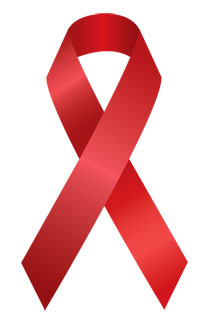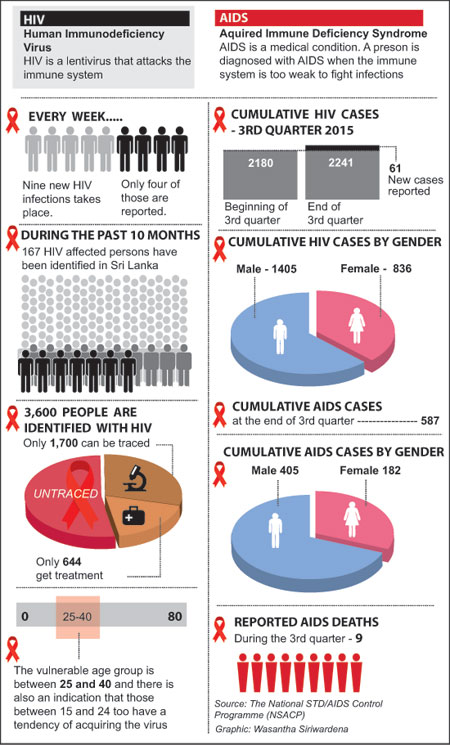The new HIV reality
With around 20 children being diagnosed as HIV
positive, Sri Lanka is upping the ante on blood tests for students:
by Rukshana Rizwie
 Minister of Health and Indigenous Medicine Dr Rajitha Senaratne told
Parliament that around 20 schoolchildren in Sri Lanka were infected with
HIV. He noted that a compulsory blood test to detect all diseases
including HIV/AIDS would be introduced for students sitting the Advanced
Level examinations, University entrants and sports club members. Minister of Health and Indigenous Medicine Dr Rajitha Senaratne told
Parliament that around 20 schoolchildren in Sri Lanka were infected with
HIV. He noted that a compulsory blood test to detect all diseases
including HIV/AIDS would be introduced for students sitting the Advanced
Level examinations, University entrants and sports club members.
“This is long overdue objective we have been striving to achieve,”
said Dr. Dayanath Ranatunga, Country Manager for UNAIDS. “We have been
at the receiving end of so much resistance from policy makers, that an
announcement of this nature is a reprieve.”
Of the 20 schoolchildren who were infected with the virus, 15 were
infected with the virus from their mothers.
HIV is transmitted through direct contact with blood or body fluid of
someone who is infected with the virus. Among children, most cases are
due to a mother passing on the HIV infection to her baby during
pregnancy or birth or through breast feeding.
“Ensuring that pregnant women get HIV tests and antiretroviral
treatment if they test positive, is key to preventing the
mother-to-child transmission,” Dr Ranatunga added. “If left untreated,
HIV-positive women have a 15 to 45 percent chance of transmitting the
virus to their babies during pregnancy, childbirth, or breastfeeding.”
Mother-to-child transmission
He adds that it is possible and pragmatic to prevent the transmission
of the infection. “One of the key programs in 2015 was a campaign to
ensure that pregnant women undergo tests and eight mothers who were
tested positive for HIV, ultimately delivered babies who were HIV
negative.”
This he says, is a crowning achievement. “Sri Lanka is well on its
way to the total elimination of mother-to-child HIV transmission by
early 2016,” he said. “This would make us the first country in the Asian
region to achieve the feat.”
In June this year, Cuba became the first country to receive WHO
validation that it had eliminated the transmission of HIV and syphilis
from mothers to children. UNAIDS believes Sri Lanka will certainly
follow.
Meanwhile, a new study published in The Lancet medical journal on
November 18, found that giving anti-AIDS drugs directly to infants
breastfed by their HIV-positive mothers significantly reduced their risk
of contracting the killer virus. This was the first study done to assess
the effectiveness of AIDS drugs to prevent mother-to-child transmission
in infants breastfed for longer than six months.
 Dr Ranatunga cautioned that compulsory blood tests to detect diseases
including sexually transmitted diseases such as HIV/AIDS should not be
restricted to merely Advanced Level students or university entrants. Dr Ranatunga cautioned that compulsory blood tests to detect diseases
including sexually transmitted diseases such as HIV/AIDS should not be
restricted to merely Advanced Level students or university entrants.
“There is a bigger pool of students who drop out of school soon after
their Advanced Level examinations,” he said. “Not all of them pass their
A-levels exams or enter universities.”
Dr Sisira Liyanage who heads the National program cited that
currently university students have to submit a medical fitness form
which includes a VDRL test which is to check for syphilis but he said
that they would now offer an optional test to check for HIV as well.
“We cannot force students to do the test but we can advice them and
hope that they will consider it,” he said. “Most infections among
children and adolescent in Sri Lanka are from mother-to-child
transmissions.”
Advocacy through education
He cited that a pragmatic solution that the UNAIDS were advocating
was the inclusion for a subject on comprehensive reproductive and sex
education in the national school curriculum. “This undoubtedly calls for
a bigger coalition with the Ministry of Health and Ministry of
Education,” he said citing that both stakeholders had been complacent
with their approach.
“Based on state statistics, up to 10% of the total pregnancies were
teen pregnancies, which tallies to roughly 20 000 a year,” he said. “Now
picture the difference it would make if young girls and boys could be
better educated about reproductive health, STDs and prevention.”
He added that at present, the Health Education was the only subject
which makes note of STDs. But only 40% of the Ordinary Level students
follow this subject since its not compulsory.
Minister Senaratne while responding to a question posed by UPFA
parliamentarian Dullas Alahapperuma also said that steps would be taken
to introduce health education as a compulsory subject for the GCE
O/Level Examination.
“What we believe at UNAIDS is that there needs to be a collective and
collateral effort to militate the current trends,” he said. “The fight
against AIDS and HIV starts with ensuring t that the younger generation
is better educated about the virus.”
Dr. Ranathunga said that it is estimated that 90% of all HIV
infections in Sri Lanka occur through unprotected heterosexual contact.
“We are dealing with several segments of the community who are very
hard to reach,” he said. “If laws were better amended, both National and
NGO programs could be better targeted at these segments.”
-----
UNAIDS urges:
* For the formation of a National HIV/AIDS prevention council, to be
chaired by the President with the relevant ministries represented, such
as Ministry of Education, Health, Sports, Youth, Foreign Employment.
* Make Rapid Test for HIV available at all local and private
hospitals for a nominal charge. (The Rapid Test detects HIV antibodies
in the blood, with results available almost immediately. Dr. Ranatunga
charged that several people who come for tests do not return to collect
their results due to the waiting period)
* Accept various segments of the community who are particularly
vulnerable to the infection such as sex workers, LGBT. Amend existing
discriminatory and outdated British laws such as vagrance ordinance
established in 1984.
* Drug rehabilitation mechanism should be looked into.
* Currently drug users are rehabilitated on a spiritual basis where
meditation and therapy produce very poor results. In other countries
drug addiction is considered a mental illness, it should be the same
here.
|

